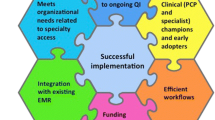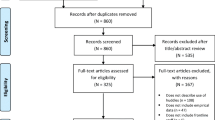Abstract
Background
Multi-disciplinary Meetings (MDM) play a crucial role in complex patient care, involving input from various specialties to formulate evidence-based management plans. However, traditional unidirectional approaches and reliance on manual processes have led to inefficiencies in the MDM pathway.
Aims
This study identified and aimed to improve four critical moments where Information Communication Technologies (ICTs) could enhance the MDM process. Initial referral, information synthesis, meeting presentation and the creation of actionable/auditable items.
Methods
Microsoft Office Forms, a customisable survey platform, was implemented to streamline MDM processes. Forms were created to gather patient information, develop agendas, and track outcomes. Automation through Excel scripting further optimised data organisation and agenda creation.
Results
Referrals using Forms takes an average of 7 min and 21 s. Over 15 months the submission time has reduced and is trending towards under 5 min for each referral. The system's scalability has allowed 1744 cases to be discussed over a 15-month period. Active departments using Forms is expanding to seven from two prior to the pilot.
Conclusion(s)
Microsoft Office Forms proved to be a valuable and adaptable tool for MDMs, offering benefits such as streamlined information gathering, real-time collaboration, and scalability. The study highlights the potential of existing tools within Microsoft licenses for healthcare process optimisation, providing a cost-effective and customisable solution for MDM agendas. While recognising some limitations, the study concludes that leveraging Microsoft Office Forms can significantly improve system efficiency in a multi-disciplinary setting.







Similar content being viewed by others
References
Ruhstaller T, Roe H, Thürlimann B, Nicoll JJ (2006) The multidisciplinary meeting: An indispensable aid to communication between different specialities. Eur J Cancer 42:2459–2462
Nouraei SAR, Philpott J, Nouraei SM et al (2007) Reducing referral-to-treatment waiting times in cancer patients using a multidisciplinary database. Ann R Coll Surg Engl 89:113–117
Chang JH, Vines E, Bertsch H et al (2001) The impact of a multidisciplinary breast cancer center on recommendations for patient management: the University of Pennsylvania experience. Cancer 91:1231–1237
Fleissig A, Jenkins V, Catt S, Fallowfield L (2006) Multidisciplinary teams in cancer care: are they effective in the UK? Lancet Oncol 7:935–943
Junor EJ, Hole DJ, Gillis CR (1994) Management of ovarian cancer: referral to a multidisciplinary team matters. Br J Cancer 70:363–370
Brar SS, Hong NL, Wright FC (2014) Multidisciplinary cancer care: does it improve outcomes? J Surg Oncol 110:494–499
Rosell L, Alexandersson N, Hagberg O, Nilbert M (2018) Benefits, barriers and opinions on multidisciplinary team meetings: a survey in Swedish cancer care. BMC Health Serv Res 18:249. https://doi.org/10.1186/s12913-018-2990-4
McNair AGK, Choh CTP, Metcalfe C et al (2008) Maximising recruitment into randomised controlled trials: the role of multidisciplinary cancer teams. Eur J Cancer 44:2623–2626
Acknowledgements
The authors would like to thank Mr. Michael Watkins, Cancer Database Coordinator, Sir Charles Gairdner Hospital (Perth, Australia).
Author information
Authors and Affiliations
Corresponding author
Ethics declarations
Research involving human beings and/or animals
None.
Informed consent
Not needed as the research did not involve human participants nor animals.
Conflicts of interest
Dr Yuigi Yuminaga owns shares in Microsoft Corporation.
Additional information
Publisher's Note
Springer Nature remains neutral with regard to jurisdictional claims in published maps and institutional affiliations.
Rights and permissions
About this article
Cite this article
Magee, D., Barns, M., Chau, M. et al. Integration of an online application to optimise multi-disciplinary meetings: a retrospective analysis. Ir J Med Sci (2024). https://doi.org/10.1007/s11845-024-03685-7
Received:
Accepted:
Published:
DOI: https://doi.org/10.1007/s11845-024-03685-7




